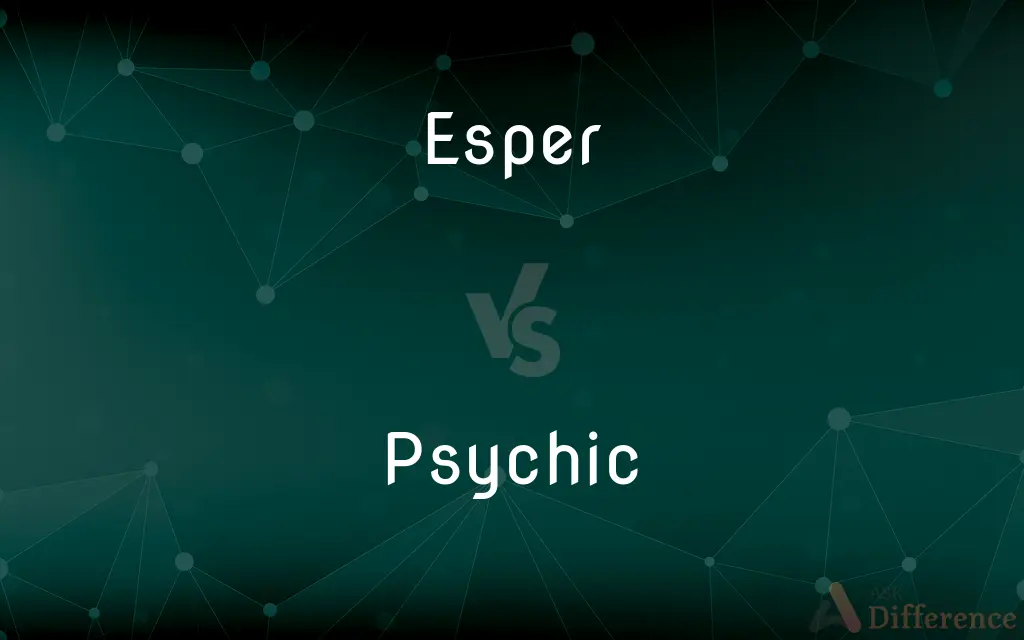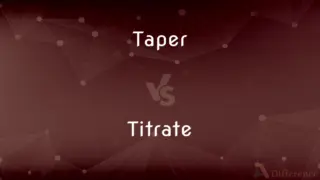Esper vs. Psychic — What's the Difference?
Edited by Tayyaba Rehman — By Fiza Rafique — Updated on March 11, 2024
"Esper" often refers to individuals with extrasensory perception in fiction, while "psychic" denotes a broader range of paranormal abilities, including ESP.

Difference Between Esper and Psychic
Table of Contents
ADVERTISEMENT
Key Differences
Espers are typically characterized in science fiction and fantasy as individuals who possess extrasensory perception (ESP), such as telepathy, telekinesis, or other mind-based powers. These abilities are often depicted as the result of genetic mutations, scientific experiments, or evolutionary advancements. On the other hand, psychics are believed to have a wide array of supernatural abilities that extend beyond ESP, including clairvoyance, mediumship, and precognition. The term "psychic" is used in both fictional and real-world contexts to describe people who claim or are believed to have paranormal abilities.
While espers are often portrayed as using their powers through a form of mental discipline or as a result of scientific enhancement, psychic abilities are frequently depicted as innate and sometimes uncontrollable powers that can manifest in various ways. Psychics might use tools like tarot cards, crystal balls, or runes to channel their abilities, whereas espers' powers are usually depicted as directly emanating from their own minds or bodies.
The concept of espers often leans towards a scientific or futuristic explanation for their abilities, aligning with the genres of science fiction and cyberpunk. In contrast, psychic abilities are commonly associated with mystical, spiritual, or supernatural explanations, finding a place in a wide range of genres from horror to fantasy.
Cultural perception also differs; espers are mainly a staple of speculative fiction and are not widely claimed to exist in reality. Psychics, however, are part of both real-world belief systems and entertainment, with some individuals and practices claiming to offer genuine psychic services, often subject to skepticism and scientific scrutiny.
Comparison Chart
Origin of Abilities
Often attributed to scientific or futuristic sources
Typically considered innate or supernatural
ADVERTISEMENT
Types of Abilities
Primarily ESP, like telepathy and telekinesis
Broad range, including ESP, clairvoyance, and mediumship
Manifestation
Powers usually manifest through mental discipline
Abilities can be innate and vary in control and manifestation
Cultural Context
Common in science fiction and fantasy
Found in various genres and real-world belief systems
Public Perception
Viewed as fictional
Mixed; some believe in real-world psychics, while others are skeptical
Compare with Definitions
Esper
Foresees future events.
The esper predicted the disaster before it happened.
Psychic
Sees events beyond normal vision.
The psychic described a distant location in detail without having seen it.
Esper
Communicates thoughts.
The esper could silently transmit messages to his allies.
Psychic
Foretells the future using tools.
The psychic used tarot cards to predict her client's fate.
Esper
Moves objects with the mind.
The young esper lifted the car with a mere thought.
Psychic
Communicates with spirits.
The psychic medium relayed messages from deceased relatives.
Esper
Exhibits extrasensory perception.
The esper sensed the hidden emotions of those around him.
Psychic
Senses others' emotions.
The psychic felt the crowd's panic before the chaos erupted.
Esper
Manipulates physical matter.
The esper bent the metal spoon without touching it.
Psychic
Channels energy to heal.
The psychic claimed to heal ailments through spiritual energy.
Esper
A person who practices the development of psychic ability.
Psychic
A psychic is a person who claims to use extrasensory perception (ESP) to identify information hidden from the normal senses, particularly involving telepathy or clairvoyance, or who performs acts that are apparently inexplicable by natural laws, such as psychokinesis or apportation. Although many people believe in psychic abilities, the scientific consensus is that there is no proof of the existence of such powers, and describes the practice as pseudoscience.
Esper
A person who has extrasensory perception.
Psychic
A person apparently responsive to psychic forces.
Psychic
See medium.
Psychic
Of, relating to, affecting, or influenced by the human mind or psyche; mental
Psychic trauma.
Psychic energy.
Psychic
Capable of extraordinary mental processes, such as extrasensory perception and mental telepathy.
Psychic
Of or relating to such mental processes.
Psychic
A person who possesses, or appears to possess, extra-sensory abilities such as precognition, clairvoyance and telepathy, or who appears to be susceptible to paranormal or supernatural influences.
Psychic
(parapsychology) A person who supposedly contacts the dead; a medium.
Psychic
(gnosticism) In gnostic theologian Valentinus' triadic grouping of man the second type; a person focused on intellectual reality (the other two being hylic and pneumatic).
Psychic
Relating to or having the abilities of a psychic.
You must be psychic—I was just about to say that.
She is a psychic person—she hears messages from beyond.
Psychic
Relating to the psyche or mind, or to mental activity in general.
Psychic
Of or pertaining to the human soul, or to the living principle in man.
Psychic
Of or pertaining to the mind, or its functions and diseases; mental; - contrasted with physical.
Psychic
A person apparently sensitive to things beyond the natural range of perception
Psychic
Pertaining to forces or mental processes outside the possibilities defined by natural or scientific laws;
Psychic reader
Psychical research
Psychic
Affecting or influenced by the human mind;
Psychic energy
Psychic trauma
Psychic
Outside the sphere of physical science;
Psychic phenomena
Common Curiosities
How are espers created in stories?
Espers are usually portrayed as having developed their abilities through evolution, scientific experiments, or mutations.
Can espers use their powers at will?
In fiction, espers often control their abilities at will, though this can vary depending on the story.
How do espers differ from magicians in fiction?
Espers use innate or scientifically enhanced abilities related to the mind, while magicians typically use external sources of power or learned spells.
Are all espers psychics?
While espers possess psychic-like abilities, not all psychics are espers, as psychic abilities encompass a broader range.
Do psychics exist in the real world?
While many claim psychic abilities, these claims are often met with skepticism and lack empirical evidence.
Are psychic abilities always supernatural?
In fiction, psychic abilities are often supernatural, but they can also be explained through pseudo-scientific means, especially in science fiction narratives.
Is telekinesis exclusive to espers?
Telekinesis is a common trait among espers but can also be a psychic ability or magical power in various fictional contexts.
How do cultural beliefs influence the perception of psychics?
Cultural and personal beliefs play a significant role in how individuals perceive psychics, ranging from complete acceptance to outright skepticism.
Can psychic abilities be learned or enhanced?
In some narratives, psychic abilities can be honed or enhanced through practice, training, or specific artifacts.
Are there ethical considerations for using esper or psychic abilities in stories?
Fiction often explores the ethical implications of using such powers, including privacy invasion, manipulation, and the consequences of altering natural events.
Share Your Discovery

Previous Comparison
Taper vs. Titrate
Next Comparison
Luck vs. LuckinessAuthor Spotlight
Written by
Fiza RafiqueFiza Rafique is a skilled content writer at AskDifference.com, where she meticulously refines and enhances written pieces. Drawing from her vast editorial expertise, Fiza ensures clarity, accuracy, and precision in every article. Passionate about language, she continually seeks to elevate the quality of content for readers worldwide.
Edited by
Tayyaba RehmanTayyaba Rehman is a distinguished writer, currently serving as a primary contributor to askdifference.com. As a researcher in semantics and etymology, Tayyaba's passion for the complexity of languages and their distinctions has found a perfect home on the platform. Tayyaba delves into the intricacies of language, distinguishing between commonly confused words and phrases, thereby providing clarity for readers worldwide.















































